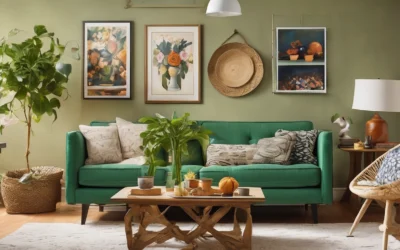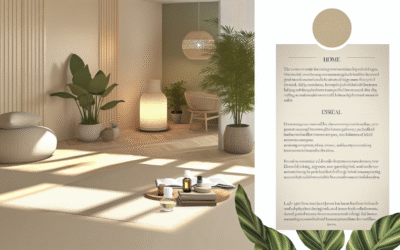
Have you ever walked into a space that felt both calming and invigorating, where every element seemed thoughtfully placed? That’s the essence of Japandi minimalist style—a fusion of Japanese and Scandinavian design philosophies that emphasizes simplicity, functionality, and natural beauty. In this article, you’ll explore how to transform your space into a tranquil oasis, using the principles of Japandi design and natural materials. By the end, you’ll be armed with actionable insights to achieve a harmonious home that reflects both serenity and style.
We’ll discuss:
- The foundational principles of Japandi style
- Natural materials that enhance this aesthetic
- Practical tips for incorporating these elements into your home
- Case studies showcasing successful Japandi designs
- FAQs to address common queries
The Basics of Japandi Minimalist Style
To understand Japandi, it’s essential to grasp the roots of its two components—Japanese and Scandinavian styles.
Japanese Design Influences
Japanese interiors prioritize functionality, incorporating elements like tatami mats and sliding doors that maximize space. This style champions natural light and indoor-outdoor living.
Scandinavian Design Influences
Scandinavian design emphasizes simplicity and minimalism, featuring light colors and functional furniture. It embraces a clutter-free approach that promotes a warm and inviting atmosphere.
How Japandi Merges Both Styles
Japandi combines the warmth of Scandinavian aesthetics with the understated elegance of Japanese design. The result? A tranquil, purposeful space that feels both modern and timeless.
Key Features of Japandi Style
Natural Materials
Natural materials are central to Japandi’s aesthetic, enhancing a sense of authenticity. Wood, stone, and metal bring organic textures into the home.
Earthy Color Palettes
Muted, earthy tones dominate the Japandi palette—think soft whites, greys, and beiges, complemented by muted greens and browns, which reflect nature.
Functional Furniture
Furniture in a Japandi home is not just stylish, but practical. Look for pieces that are low-profile, multi-purpose, and crafted with quality materials.
Decluttered Aesthetic
Emphasizing the “less is more” philosophy, Japandi design adopts a minimalist approach. Every item serves a purpose while contributing to the overall aesthetic.
Natural Materials to Embrace
Wood
Wood, particularly light woods like pine and oak, plays a significant role in Japandi interiors. Its organic nature brings warmth and texture.
Stone
Incorporating stone, such as slate or marble, adds elegance and durability. Exposed stone walls or countertops can be a focal point.
Bamboo and Rattan
These materials offer sustainable options for furniture and decor, embodying both durability and eco-friendliness.
By prioritizing these materials, you can create spaces that resonate with the natural world.
Implementing Japandi Style in Your Home
Room by Room Guide
Living Room
Focus on creating an open, airy space. Use low furniture, a neutral palette, and minimal decor to highlight simplicity.
Bedroom
Your bedroom should evoke peace. Opt for soft bedding in natural materials, wooden bed frames, and gentle lighting to keep the vibe serene.
Kitchen
In the kitchen, prioritize functionality. Use wood cabinets, understated appliances, and open shelving to maintain a clean look.
Practical Tips for a Japandi Makeover
- Incorporate plants to bring life into the space.
- Focus on one or two statement pieces rather than overwhelming decor.
- Use warm lighting to create a cozy ambiance.
Real-World Case Studies
Case Study: Urban Retreat
An apartment in Tokyo exhibits Japandi style beautifully. The owners utilized bamboo furniture, neutral tones, and natural light to create a peaceful refuge amidst urban chaos.
Case Study: Scandinavian Cabin
A small cabin in Norway showcases the perfect blend of both styles, with wooden beams, large windows, and minimalistic decor that welcomes nature inside.
Frequently Asked Questions
What is the main idea of Japandi style?
Japandi combines the aesthetics of Japanese and Scandinavian design to create serene, functional spaces that highlight natural beauty through minimalism.
Can I mix Japandi with other styles?
Yes, Japandi can blend beautifully with rustic or modern styles, as long as the ethos of minimalism and natural materials remains intact.
Are natural materials necessary for Japandi?
While they are essential for creating authentic Japandi spaces, you can incorporate synthetic materials if they are used sparingly and maintain a natural aesthetic.
How do I declutter for Japandi?
Start by evaluating each item’s function and aesthetic value. Keep only what you truly love and use, focusing on quality over quantity.
Conclusion & Next Steps
Incorporating Japandi minimalist style into your home can lead to a life of simplicity, calm, and purpose. As you embrace natural materials and declutter your space, remember that every element should reflect your unique personality. Start small—choose one room to transform and gradually extend the aesthetics throughout your home.
For further reading, check our articles on related topics like “Sustainable Interior Design” and “Maximizing Small Spaces”. Happy decorating!
Content Disclaimer
The information in this article is provided for educational purposes only and should not be considered professional advice. Consult relevant experts for specific guidance.
Categories
- Accent Walls & Ceilings (61)
- Art Curation & Gallery (62)
- Bedding Style Trends (68)
- Bedroom Makeover (81)
- Bohemian & Eclectic Styles (58)
- DIY & Budget-Friendly Decor (64)
- Eco-Friendly Design (62)
- Furniture Care (71)
- Home Decor & Design Ideas (162)
- Home Wellness Spaces (59)
- Integrated Outdoor Living (67)
- Japandi Style (61)
- Kids and Nursery Decor (59)
- Living Room Decor (79)
- Mix & Match Techniques (73)
- Modern & Contemporary Design (66)
- Rug Sizing & Placement (73)
- Scandinavian Design Inspiration (20)
- Seasonal Home Decor (79)
- Small Space Solutions (73)
- Wall Art & Painting Tips (77)
Recent Comments
Archives
Product Gallery
-
Large Area Green Rugs for Bedroom Nordic Living Room Decoration Shaped Carpet Irregular Plush Lounge Rug Home Thick Washable Mat
Rated 5.00 out of 5$36.00 – $225.00Price range: $36.00 through $225.00 -
Nordic Style Rugs for Bedroom Morandi Living Room Decoration Carpet Large Area Geometry Lounge Rug Home Cloakroom Non-slip Mat
Rated 5.00 out of 5$26.00 – $387.00Price range: $26.00 through $387.00 -
Irregular Shapes Living Room Decoration Carpet Modern Style Rugs for Bedroom Home Thicken Plush Rug Fluffy Soft Lounge Floor Mat
Rated 4.83 out of 5$37.00 – $225.00Price range: $37.00 through $225.00














